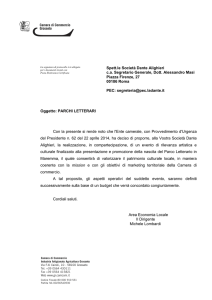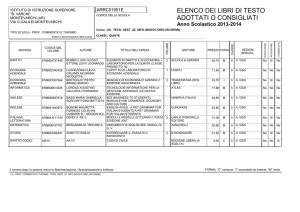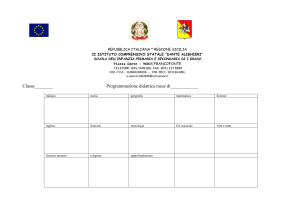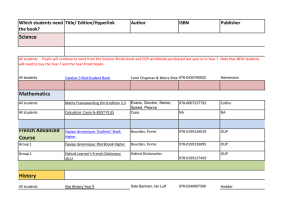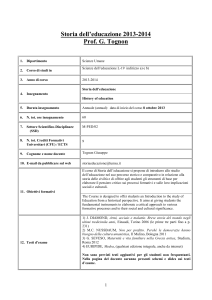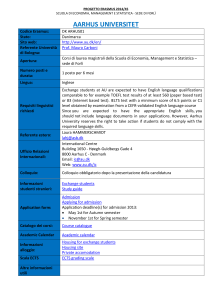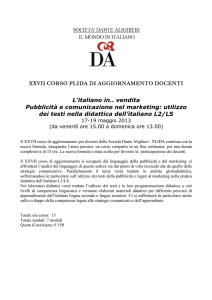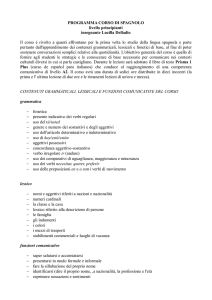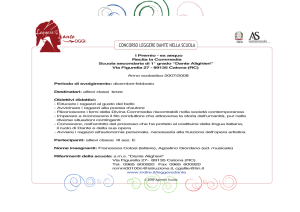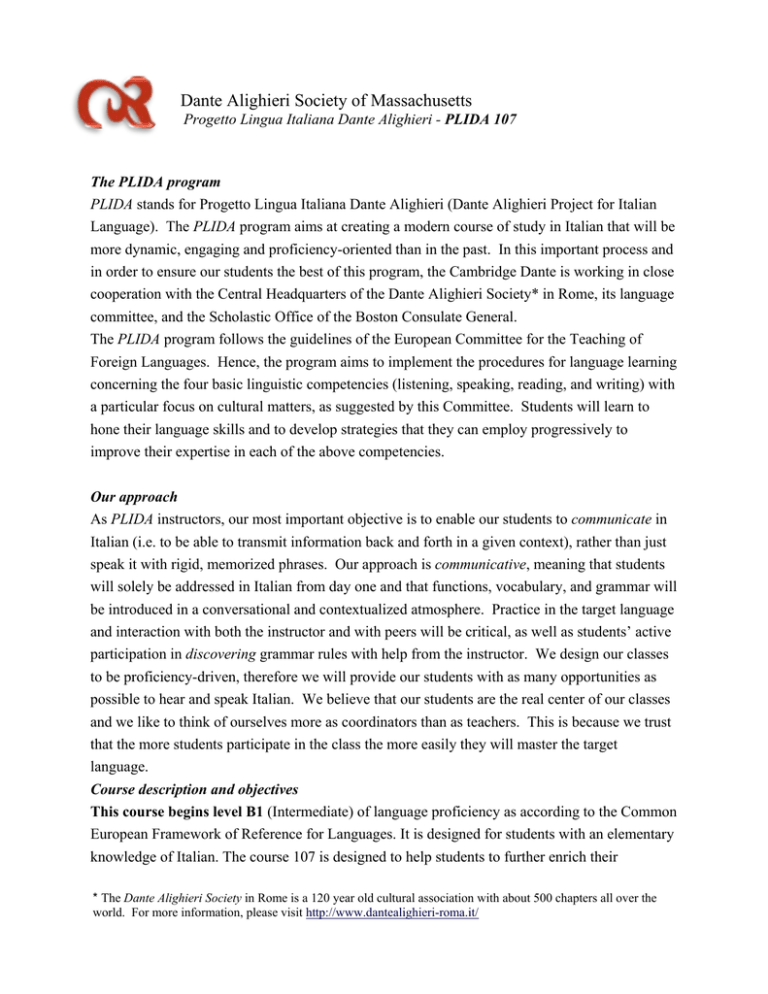
Dante Alighieri Society of Massachusetts
Progetto Lingua Italiana Dante Alighieri - PLIDA 107
The PLIDA program
PLIDA stands for Progetto Lingua Italiana Dante Alighieri (Dante Alighieri Project for Italian
Language). The PLIDA program aims at creating a modern course of study in Italian that will be
more dynamic, engaging and proficiency-oriented than in the past. In this important process and
in order to ensure our students the best of this program, the Cambridge Dante is working in close
cooperation with the Central Headquarters of the Dante Alighieri Society* in Rome, its language
committee, and the Scholastic Office of the Boston Consulate General.
The PLIDA program follows the guidelines of the European Committee for the Teaching of
Foreign Languages. Hence, the program aims to implement the procedures for language learning
concerning the four basic linguistic competencies (listening, speaking, reading, and writing) with
a particular focus on cultural matters, as suggested by this Committee. Students will learn to
hone their language skills and to develop strategies that they can employ progressively to
improve their expertise in each of the above competencies.
Our approach
As PLIDA instructors, our most important objective is to enable our students to communicate in
Italian (i.e. to be able to transmit information back and forth in a given context), rather than just
speak it with rigid, memorized phrases. Our approach is communicative, meaning that students
will solely be addressed in Italian from day one and that functions, vocabulary, and grammar will
be introduced in a conversational and contextualized atmosphere. Practice in the target language
and interaction with both the instructor and with peers will be critical, as well as students’ active
participation in discovering grammar rules with help from the instructor. We design our classes
to be proficiency-driven, therefore we will provide our students with as many opportunities as
possible to hear and speak Italian. We believe that our students are the real center of our classes
and we like to think of ourselves more as coordinators than as teachers. This is because we trust
that the more students participate in the class the more easily they will master the target
language.
Course description and objectives
This course begins level B1 (Intermediate) of language proficiency as according to the Common
European Framework of Reference for Languages. It is designed for students with an elementary
knowledge of Italian. The course 107 is designed to help students to further enrich their
* The Dante Alighieri Society in Rome is a 120 year old cultural association with about 500 chapters all over the
world. For more information, please visit http://www.dantealighieri-roma.it/
knowledge of verb tenses, refine their vocabulary related to common and familiar contexts
(work, school, leisure), and exchange information with precision and confidence about events,
dreams, hopes and personal interests. Students can give reasons and explanations for opinions
and plans. They learn how to deal with situation while travelling in Italy.
By the end of this class, students will be able to:
- Explain how, where and when something has been learned;
- Explain, define one’s abilities;
- Express wish, surprise, anger, agreement, disagreement and disbelief;
- Express an opinion in comfortable or uncomfortable situations;
- Complain about something wrong;
- Identify other people’s opinions;
- Describe an itinerary;
- Select an itinerary and explain the reasons for that choice;
- Speak about families and describe the family members and their personalities;
- List positive and negative aspects.
By the end of this level, students will also:
- Have an understanding of “you” formal or “you” informal in the relationship between
teachers and students and in other situations that may occur;
- Life and family and rite of passage;
- Taboo.
Textbooks
- Savorgnani/Alberti, Chiaro! B1, Corso di italiano, Libro dello studente ed eserciziario. Prima
edizione. Alma Edizioni, Firenze, 2012. (The textbook can be purchased at the Dante
Alighieri in Cambridge)
- Recommended grammar of reference: Practice Makes Perfect: Complete Italian Grammar
(Practice Makes Perfect Series), by Marcel Danesi, McGraw-Hill Companies, 2009.
- Students are also encouraged to purchase an Italian/English dictionary.
Attendance and Participation
Although attendance is not mandatory for this class, we recommend that you come regularly. In
class, you will be invited to participate actively and constructively in all the activities in order to
practice acquired knowledge and make the best of your communication skills in Italian. It’s in
class that you will find people to practice with and someone who will help you understand your
mistakes. And remember: Don’t be shy! You are here to learn and making mistakes is a natural
part of the learning process. After all mistakes are part of the fun!
Emergency Contacts:
In case of an emergency, students can receive the school cancellation notice on the TV stations NBC
Channel 7 News and CW Channel 56. They can also be notified on their cell phones by going to
www.whdh.com and click on "Snow Day Alert". Students will need to input their cell phone number, the
name of the carrier and can choose the schools they are interested in hearing about. Students can easily
add or remove schools from their profile at any time.
Calendar:
Data
Obiettivi della lezione
Lezione 1
Rinfreschiamo il nostro Italiano!
Obiettivi comunicativi:
- Presentarsi e presentare, chiedere e dare informazioni personali, chiedere
e parlare delle abitudini attuali e passate. Parlare delle attività quotidiane e
del fine settimana; esprimere preferenze, raccontare e chiedere di un
evento imprevisto (furto, smarrimento di un oggetto con descrizione
dell’oggetto), parlare della propria salute, delle vacanze
Obiettivi grammaticali e lessicali:
- La concordanza del sostantivo e dell’aggettivo, il Presente indicativo di
verbi regolari, irregolari e riflessivi, il Passato Prossimo dei verbi regolari
e di alcuni verbi irregolari, l’Imperfetto dei verbi regolari e di alcuni verbi
irregolari in -are, -ere, -ire, la differenza tra l’uso del Passato prossimo e
dell’Imperfetto, il superlativo relativo; l’Imperativo, il Condizionale
presente; vocabolario relativo a: la vita quotidiana (la moda e
abbigliamento, la musica, ricette, sicurezza stradale, le parti del corpo)
espressioni di tempo (da bambino, da giovane, ecc.)
Data
Obiettivi della lezione
Lezione 2
Lezione 1: Il piacere di imparare
e
Lezione 3
Obiettivi comunicativi:
- Spiegare come, dove e quando si è imparato qualcosa
- Definire le proprie capacità e parlare di esperienze di apprendimento
- Esprimere desideri e preferenze ed indicare e fornire una motivazione
Obiettivi grammaticali e lessicali:
- Riuscire a + infinito
- Essere capaci di + infinito
- Mi piacerebbe + infinito
- Il pronome relativo cui
- Essere bravo a + infinito
- Essere bravo in + sostantivo
- Apprendimento (abilità, obbiettivi, “strumenti”)
Note culturali:
- Il rapporto fra insegnante e discente il “tu” generalizzato
Data
Obiettivi della lezione
Lezione 4
Lezione 2: Un viaggio indimenticabile
e
Obiettivi comunicativi:
- Esprimere sorpresa o collera e protestare
- Calmare la collera altrui
- Descrivere un itinerario
- Scegliere un itinerario e motivare la scelta
Lezione 5
Obiettivi grammaticali e lessicali:
- Aggettivi in -bile
- La forma impersonale dei verbi riflessivi
- posizione dei pronomi con l’Imperativo
- l’aggettivo proprio
- lessico relativo agli itinerari, ai mezzi di trasporto, e all’ambiente
naturale
Nota culturale:
- Il galateo del turista
Lezione 6
Revisione delle lezioni 1 e 2
Quiz I sulle lezioni 1 e 2
Data
Obiettivi della lezione
Lezione 7
Lezione 3: Mosaici familiari
e
Obiettivi comunicativi:
- parlare della famiglia
- descrivere e paragonare situazioni ed atteggiamenti
- capire un’opinione espressa da altri
- esprimere la propria opinione anche in riferimento a problemi
Lezione 8
Obiettivi grammaticali e lessicali:
- “si” indefinito + sostantivo/aggettivo
- Mentre + imperfetto
- Il congiuntivo presente (forme e uso: penso, credo, trovo)
- Connettivi avversativi: mentre
- Lessico relativo alla famiglia
Nota culturale:
- Vita di famiglia e riti di passaggio.
Data
Obiettivi della lezione
Lezione 9
Lezione 4: Il mondo in rete
e
Obiettivi comunicativi:
- Fare una supposizione
- descrivere il carattere delle persone
- esprimere opinioni e impressioni; esprimere accordo o disaccordo,
- esprimere incredulità, volontà
- elencare aspetti positivi e negativi
Lezione 10
Obiettivi grammaticali e lessicali:
- Il futuro semplice
- Il congiuntivo presente con sembrare/parere e volere
- Particella “ci” con il verbo credere
- Il gerundio con funzione temporale
- Quello che
- Lessico relativo al carattere e alla personalità, rapporti interpersonali,
Internet/reti sociali
Nota culturale:
- Comunicare correttamente.
Quiz II sulla lezione 3
Presentazioni finali

